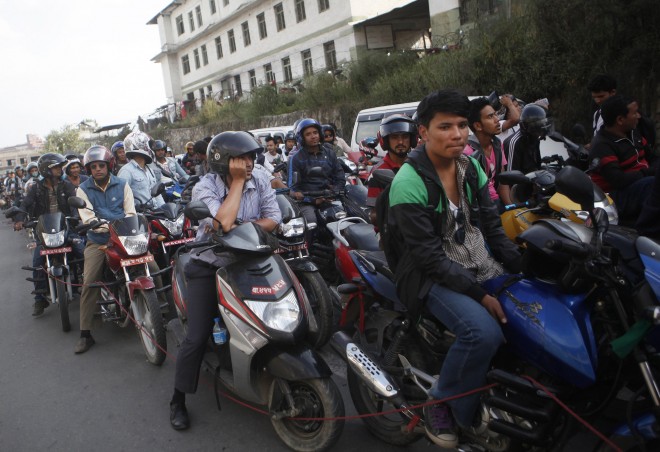Nepalis adapt to fuel shortage by carpooling, riding bikes

In this Sept. 28 photo, Nepalese motorists wait for their turn to fill fuel on their motorbikes at a fuel pump run by the Nepalese army in Kathmandu, Nepal. AP
KATHMANDU, Nepal—India’s unofficial blockade of Nepal has put a crunch on this Himalayan nation, with cars lining up for miles around gasoline stations, schools shutting down, vegetables in short supply and taxis charging four times the normal fare.
But Nepalis, whose lives were upended by a massive earthquake just a few months ago, know how to cope. In response to the fuel shortage, people are riding bikes to work, coordinating carpools on Facebook and offering lifts to strangers.
“At last, her big smile with her son made my day,” Garima Sapkota, who offered a ride to a woman who was late to pick up her son, wrote on the Facebook page Carpool Kathmandu, where hundreds of people have offered free rides, using the hashtags #offer and #ask.
While cars have dwindled on the streets, bicycle traffic and sales have increased in Kathmandu, Nepal’s capital.
“I left my motorcycle at home because I have no fuel,” said Hari Gopal Shrestha, an electrician who had peddled 5 kilometers to get to his client’s house. “It is very tiring and difficult, but I have no other option.”
Article continues after this advertisementLong lines of vehicles snaked around gasoline stations in Kathmandu amid fuel restrictions imposed by the government. Earlier in the week, the government announced that only vehicles for transport would get a rationed amount, while private vehicles would have to wait.
Article continues after this advertisement“I can drive only about 70 kilometers with what I get. How can I make a living with that?” said taxi driver Bharat Prasad Nepal, who had been waiting in line for 27 hours.
The shortages, which extend to fresh produce and medicine, come after Indian trucks carrying goods stopped at the border. Nepal obtains most of its fuel and other vital supplies from India.
Many Nepalis believe that India has been retaliating against their government since Sept. 20, when it approved a new constitution seen by New Delhi as discriminatory to an ethnic Indian community—the Madhesi—living in Nepal’s border districts.
Indian officials deny there is a blockade and say drivers are afraid to enter Nepal. Nepalese authorities say there is no trouble at many cross-border checkpoints.
Madhesis are upset that the constitution divides Nepal country into seven new states, with some borders slicing through their ancestral homeland in the southern plains. Madhesis, along with several other small ethnic groups, also want the states to be larger and be given more autonomy over local matters.
For months as Nepalese lawmakers were debating the draft constitution, these areas witnessed violent protests by Madhesis during which at least 45 people were killed. Hours after the constitution was passed, the violence escalated.
Only a few trucks with supplies, including fuel and cooking gas, tricked through this past week.
At the vegetable market in the suburban Kathmandu neighborhood of Lagankhel, people complained of higher prices.
“I have to cook for a festival and all I get is rotten onions. It has become too expensive because of the blockade,” said Dinesh Maharjan, a bus driver who was shopping.
Vegetable vendor Bekha Bahadur Prajapati said people are now buying locally produced vegetables like spinach or spring onions.
Many schools have also closed because there is no fuel to run the buses. Some of them plan to run online classes for teachers and students.
Airport authorities in Nepal have also instructed foreign airlines to fuel up before coming to Kathmandu or to stop at a city on the route because there is not much aviation fuel in stock.